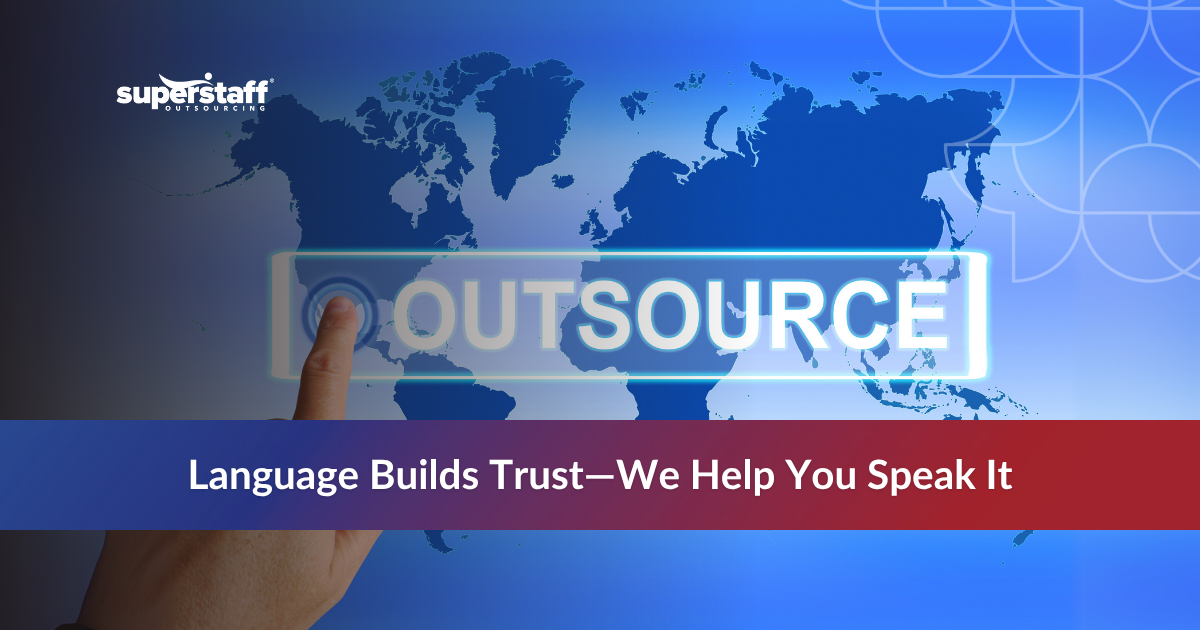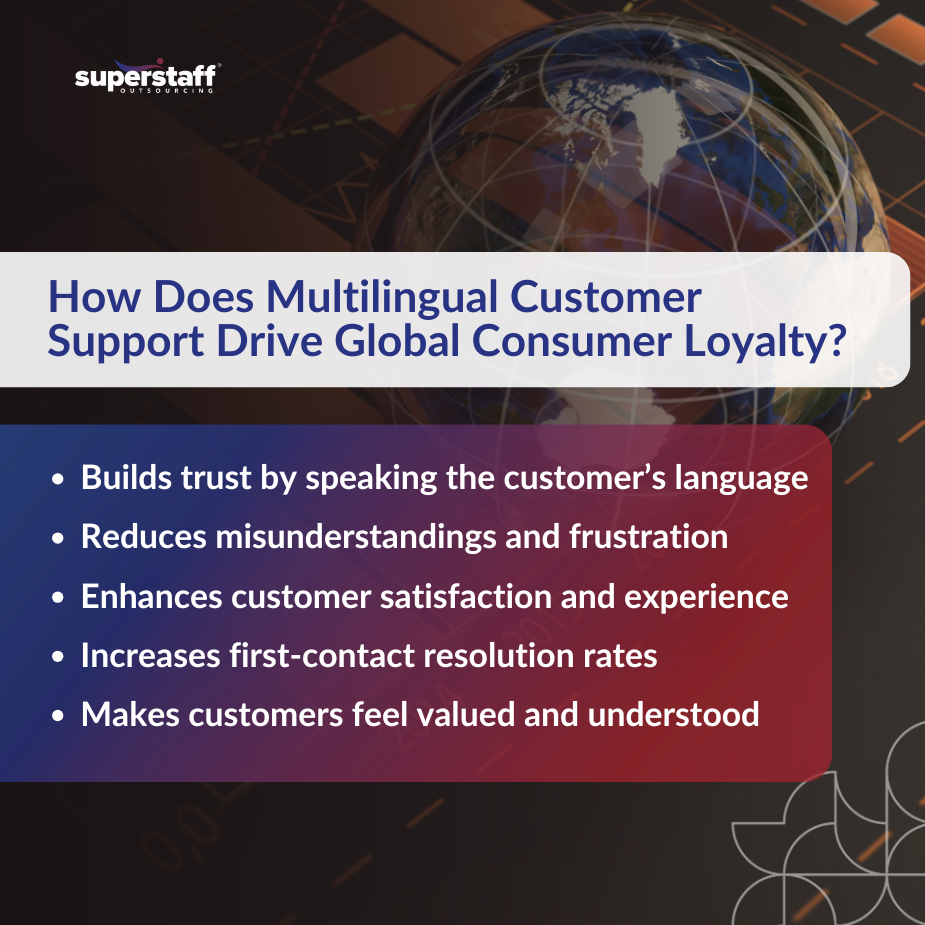
English alone isn’t enough in today’s borderless customer economy. While it remains a global lingua franca, modern consumers increasingly expect businesses to speak their language—literally. As companies expand globally, multilingual customer support becomes essential—not just for communication, but for lasting loyalty.
Studies show that customers are more likely to stay loyal to brands that communicate with them in their native tongue. Whether it’s resolving a technical issue, answering a billing question, or providing product guidance, language accessibility directly impacts satisfaction and retention. This is especially true in high-stakes industries like healthcare, finance, e-commerce, and travel.
Multilingual call centers in the Philippines are rising to meet this demand, offering a cost-effective, culturally fluent, and performance-driven solution for global brands. With a strong foundation in English and growing expertise in languages like Spanish, French, Mandarin, Korean, and German, the Philippines is becoming a global hub for multilingual support.
In this blog, we’ll explore how multilingual customer support teams based in the Philippines drive brand loyalty, deliver personalized customer experiences, and help businesses stay competitive in today’s global marketplace.
The Global Shift Toward Multilingual Customer Support
More brands are investing in multilingual support to meet the rising expectations of international customers. With the rise of global e-commerce and digital-first experiences, customer bases have become more diverse. According to Common Sense Advisory, 74% of consumers are more likely to repurchase if support is offered in their native language.
Language accessibility drives trust. When customers feel understood, they engage more positively and are more likely to stick with a brand. This emotional connection is critical in a crowded market where switching brands is as easy as clicking a button.
Multilingual customer support isn’t just a checkbox—it’s a true competitive differentiator. It enables businesses to:
- Build credibility and trust across cultures
- Reduce customer frustration and improve service quality
- Drive retention in key international markets
Cross-border commerce is also surging. The global e-commerce market is expected to be worth $6.3 trillion by 2024, underscoring the increasing number of people worldwide who are purchasing goods beyond their borders. As such, brands must accommodate this growing market by offering inclusive multilingual support.
Meeting language needs is essential, but delivering it cost-effectively and with cultural fluency is where the Philippines stands out.
Why the Philippines Is a Strategic Hub for Multilingual CX
The Philippines combines talent, training, and cultural affinity to deliver multilingual excellence. It’s no longer just the world’s go-to destination for English-speaking support—it’s fast becoming a multilingual powerhouse.
A growing number of Filipino agents are fluent in key global languages, including Spanish, Mandarin, Japanese, Korean, German, and French. This is due in part to:
- Government and private investment in language upskilling: Institutions and BPOs offer language proficiency training, certifications, and incentives.
- Strategic location: The Philippines serves as a nearshore and offshore solution for APAC, North America, and parts of Europe.
- Cultural adaptability: Filipinos are renowned for their empathy, hospitality, and high emotional intelligence—all of which are essential in customer-facing roles.
Many BPOs in the Philippines also build language-specialized teams that go beyond fluency, incorporating cultural nuance into interactions.
These strengths go beyond language—they translate into measurable gains for global businesses. These advantages highlight why multilingual customer support is no longer optional in high-growth industries.

How Multilingual Support Builds Stronger Customer Relationships
Language is just the first step—empathy and cultural understanding turn support into loyalty. A well-executed multilingual customer support program goes far beyond direct translation. It requires agents to understand the nuances of how different cultures perceive communication styles, urgency levels, and acceptable solutions. A simple phrase in one language can carry a different tone or implication in another, which can either enhance or detract from a customer experience.
When multilingual agents are trained not just in language fluency but also in cultural context, they engage with customers in a way that feels natural, respectful, and trustworthy. This alignment across both verbal and non-verbal communication strengthens relationships and builds emotional loyalty.
- Customer satisfaction (CSAT) and Net Promoter Scores (NPS): When customers interact with support teams who understand their language and cultural background, they are more likely to rate the experience positively. Higher satisfaction scores directly correlate with improved loyalty and increased lifetime customer value. Native language support reduces confusion and frustration, making the interaction smoother and more rewarding for the customer.
- First-call resolution rates and reducing repeat inquiries: Multilingual agents with deep product knowledge and cultural fluency are better equipped to resolve issues during the initial interaction. Customers don’t need to explain themselves multiple times or switch between departments. This results in reduced call volume, lower operational costs, and a stronger sense of reliability from the customer’s perspective.
- Brand perception across diverse markets: Customers form opinions about your brand based on their support experiences. If a brand consistently offers high-quality service in the customer’s native language, it signals respect, professionalism, and global readiness. Multilingual support enables brands to localize their voice while maintaining consistency, thereby enhancing credibility and trust in international markets.
In high-stress situations, such as troubleshooting complex software issues or clarifying healthcare coverage, language barriers can lead to costly miscommunication. Native language support not only prevents misunderstandings but also helps de-escalate emotional tension. When customers feel heard and understood in these moments, it becomes a turning point that strengthens loyalty and advocacy.
Industry leaders across tech, healthcare, and retail are already investing in multilingual support teams for this very reason. They understand that loyalty isn’t built on convenience alone—it’s forged through thoughtful, culturally fluent interactions that make every customer feel like a priority.
Industries Benefiting Most From Multilingual Call Center Outsourcing
From travel to tech, multilingual support is now a business necessity, not a luxury. Let’s look at how different industries are leveraging customer service outsourcing in the Philippines for multilingual CX:
- E-Commerce: Offering support in the buyer’s native language reduces cart abandonment, drives conversions, and increases repeat purchases.
- Travel & Hospitality: Multilingual assistance improves booking experiences and builds trust during last-minute travel changes or disruptions.
- Healthcare: Native-language support ensures clarity in sensitive discussions around symptoms, treatments, and insurance coverage.
- Technology: Complex issues are easier to resolve when agents can explain solutions without a language barrier.
In all these sectors, the benefits of outsourcing multilingual customer service include operational flexibility, lower overhead, and enhanced brand loyalty.
These results don’t happen by chance—they’re built through strategic partnerships.
How SuperStaff Delivers Multilingual Support That Resonates
At SuperStaff, multilingual service is tailored, strategic, and performance-driven. We recognize that global brands need more than language fluency—they need cultural nuance, customer empathy, and measurable results.
Here’s how SuperStaff leads the way:
- Flexible Hiring Models: Choose from dedicated teams, shared agents, or hybrid setups that scale with your growth.
- 24/7 Multilingual Coverage: Agents are available around the clock in multiple time zones, ready to serve global customers.
- Advanced Tools: From AI-powered sentiment analysis to real-time translation support, we equip our teams with technology to elevate CX.
Our onboarding includes culture-specific training and roleplaying to ensure agents don’t just speak the language—they understand the customer.
SuperStaff’s multilingual support isn’t just about communication—it’s about connection.
The Last Word on Multilingual Customer Support: Loyalty Starts Here
Multilingual call centers in the Philippines are driving global customer loyalty through language, empathy, and operational excellence.
Ultimately, multilingual customer support is about much more than language—it’s about meaningful customer relationships across every touchpoint. The Philippines stands out as a strategic hub, offering the ideal blend of linguistic expertise, cultural adaptability, and cost-efficiency.
Through customer service outsourcing, businesses are able to deliver inclusive and high-quality support that meets the expectations of global consumers while optimizing operational costs. As a result, outsourcing multilingual customer service leads to stronger customer retention, higher satisfaction scores, and sustainable, scalable growth across markets.
Ready to speak your customer’s language—wherever they are? Partner with SuperStaff for multilingual customer support that builds lasting customer loyalty.






